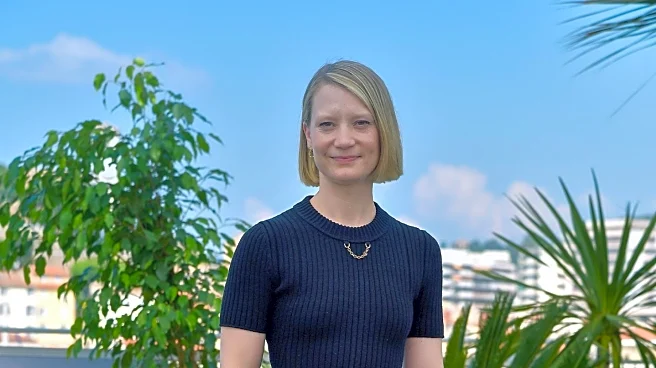What's Happening?
Eikon Therapeutics, a biopharmaceutical company, is set to present new data from its Phase 2 study of EIK1001 at the European Society for Medical Oncology (ESMO) Congress in Berlin. The study focuses on EIK1001,
a toll-like receptor 7/8 co-agonist, used in combination with pembrolizumab and chemotherapy as a first-line treatment for stage 4 non-small cell lung cancer (NSCLC). The presentation will be delivered by Dr. Richard J. Gralla from Albert Einstein College of Medicine. EIK1001 aims to stimulate the immune system to improve outcomes for patients with advanced NSCLC by enhancing anti-tumor responses. The study's primary objective is to evaluate the safety and tolerability of EIK1001 in combination with standard treatments.
Why It's Important?
The presentation of EIK1001 data is significant as it highlights a potential advancement in the treatment of advanced NSCLC, a challenging cancer type. By combining EIK1001 with pembrolizumab and chemotherapy, Eikon Therapeutics aims to broaden immune activation and improve patient outcomes. This development could lead to new treatment regimens that overcome immune resistance often seen in advanced NSCLC. The data supports the advancement of EIK1001 into a Phase 2/3 trial, potentially offering new hope for patients and impacting the oncology field by introducing innovative therapies.
What's Next?
Following the presentation at ESMO, Eikon Therapeutics plans to continue advancing EIK1001 into a registration-enabling Phase 2/3 trial. The company is also exploring the immunomodulatory mechanism of EIK1001 to improve lung cancer treatment regimens. Additionally, Eikon is advancing other oncology programs, including trials for PARP1 inhibitors and a novel program targeting Werner helicase for specific cancer types. These efforts reflect Eikon's commitment to developing groundbreaking cancer therapies and addressing unmet medical needs.
Beyond the Headlines
Eikon Therapeutics' approach integrates advanced engineering and cutting-edge research to accelerate drug discovery. Their proprietary single-molecule tracking platform informs the development of differentiated oncology programs. This innovative approach could lead to long-term shifts in cancer treatment, emphasizing the importance of integrating science and engineering in drug development.











